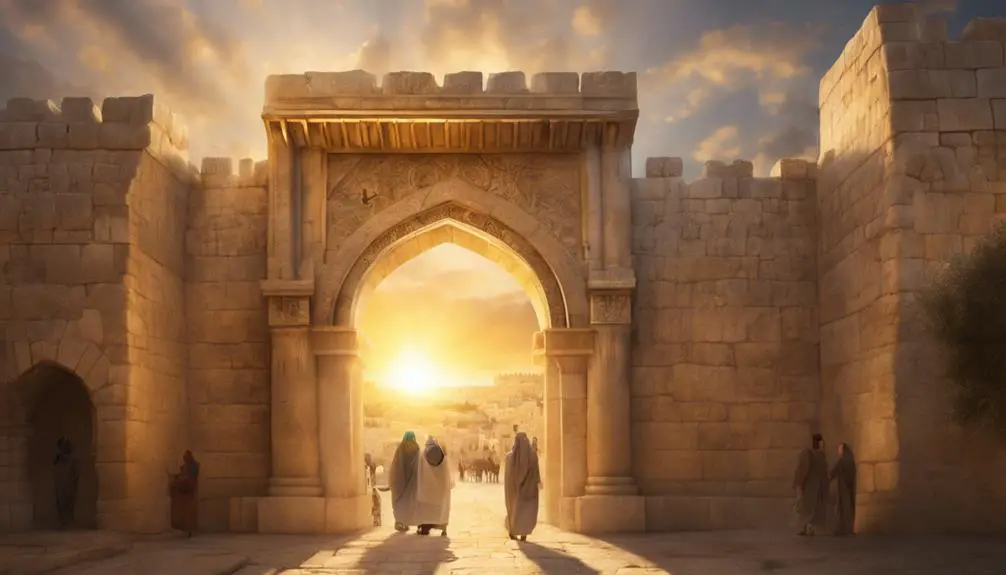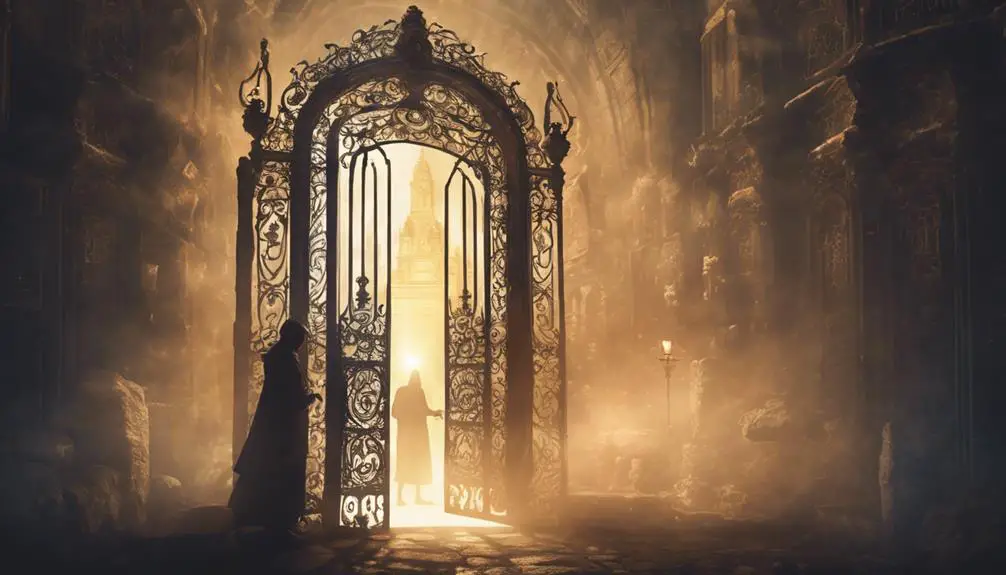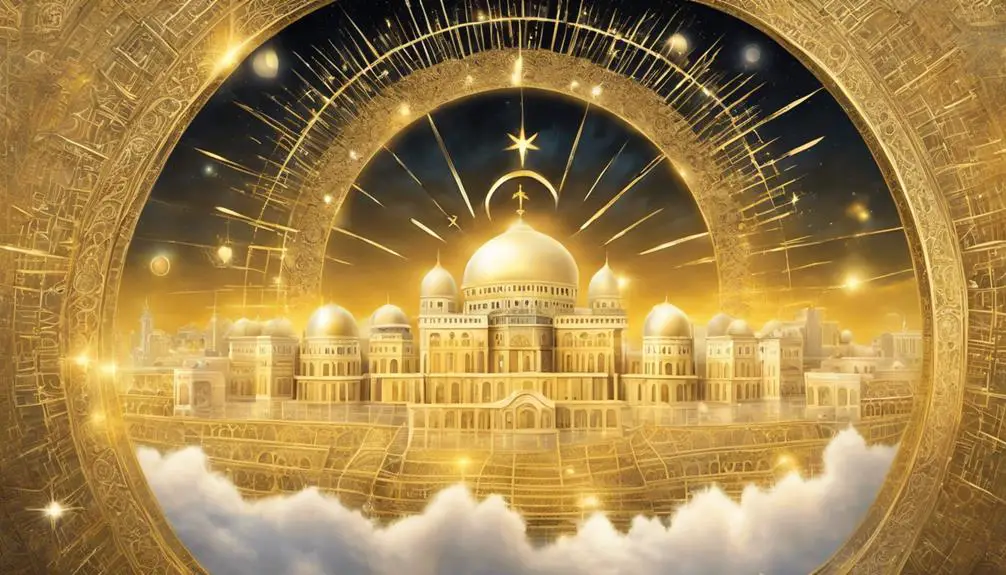A journey through biblical narratives reveals the profound spiritual significance of gates, inviting a deeper exploration of their symbolic thresholds.

Spiritual Gates in the Bible
Have you ever pondered if there's more to the concept of gates in the Bible than just architectural elements?
From the guarded gates of Eden that marked humanity's loss of innocence to the prophetic roles gates play in the visions of New Jerusalem, these passages aren't merely historical or metaphorical references. They hint at deeper spiritual truths and roles that you've likely overlooked.
As we explore these gates, you'll discover their significance in biblical narratives and prophecies, offering a fresh lens through which to view familiar stories. The journey ahead promises to unlock insights that might just reshape your understanding of spiritual thresholds.
Key Takeaways
- Gates symbolize spiritual journeys and transitions, marking pivotal moments of divine-human interaction and moral decision-making.
- The sealing and opening of gates reflect theological themes of redemption, messianic expectation, and the eternal accessibility of God.
- Gatekeepers play a crucial role in maintaining the spiritual purity and integrity of communities, embodying discernment and vigilance.
- The design and openness of the New Jerusalem's gates represent inclusivity, continuous divine access, and the fulfillment of God's promises.
Gates of Eden and Fall

The gates of Eden symbolize both the inception of humanity's spiritual journey and the profound consequences of the Fall, marking a pivotal moment in biblical narrative that invites a deeper exploration of sin and redemption. You're invited to delve into the rich layers of garden symbolism, where Eden represents an ideal state of existence, untainted by sin and in perfect harmony with the divine. This idyllic setting isn't merely a backdrop but a critical element in understanding humanity's initial relationship with God and the inherent goodness of creation.
However, the Serpent's deception at the heart of Eden introduces a complex interplay of temptation, free will, and the ensuing estrangement from paradise. This act of defiance against God's command not only alters the course of human history but also imbues the gates of Eden with a dual significance. They stand as a threshold between innocence and knowledge, purity and sin, ultimately serving as a poignant reminder of the lost paradise and the ceaseless quest for redemption. Your reflection on these themes reveals the enduring impact of the Fall, shaping theological discourse and human understanding of sin and salvation.
Abraham's Gate Encounter

Reflecting on the gates of Eden and the profound consequences of the Fall, we now turn our attention to Abraham's gate encounter, a pivotal moment that underscores the continued narrative of spiritual thresholds and divine interactions within the biblical text. Abraham's experience near the Oaks of Mamre, as detailed in Genesis, marks a significant instance where divine promises are communicated through angelic visitations at a metaphorical gate.
Aspect |
Description |
Significance |
|---|---|---|
Location |
Oaks of Mamre |
A crossroads for divine-human interaction |
Participants |
Abraham & three visitors |
Embodiment of divine presence |
Action |
Hospitality & conversation |
Facilitates the delivery of divine messages |
Promises |
Nationhood and progeny |
Affirms Abraham's role in God's plan |
Response |
Faith and obedience |
Demonstrates Abraham's righteousness |
This encounter illustrates the layered significance of gates as more than physical constructs; they are spiritual junctures where the divine reaches into the human realm. Through Abraham's willingness to engage with his visitors, we're shown how gates can be thresholds of revelation, where divine promises are both revealed and affirmed. This moment serves as a foundational example of how spiritual gates function within the biblical narrative, shaping the trajectory of human-divine relationships and the unfolding of God's promises.
Gates of Jerusalem Explored

Exploring the gates of Jerusalem unveils a rich tapestry of history and spirituality, pivotal in understanding the city's role as a focal point for divine-human interaction. Each gate not only serves as a physical entryway but also symbolizes a deeper, spiritual threshold. Delving into their historical significance and architectural designs reveals much about the city's past and its profound impact on various faiths.
- The Jaffa Gate: Serving as a primary entry to the Old City, its historical significance is unmatched. Its architectural design, a blend of medieval and Ottoman influences, reflects the city's diverse rulers over centuries.
- The Golden Gate: Unlike others, it's sealed, symbolizing future messianic expectations. Its architectural simplicity belies its spiritual complexity, hinting at its eschatological importance.
- The Damascus Gate: The most imposing in terms of architectural design, it showcases the strength and fortitude of Jerusalem's walls. Its historical significance as a trade and travel route adds layers to its identity.
- The Lion's Gate: Named for its unique stone reliefs, it's steeped in legends, embodying the city's resilience. Architecturally, it merges beauty with strategic defense, underscoring Jerusalem's multifaceted character.
This exploration transcends mere physical structures, inviting a deeper contemplation of Jerusalem's spiritual gates and their enduring legacy.
The Prophecy of Gatekeepers

Delving into biblical prophecy, we encounter the intriguing concept of gatekeepers, individuals endowed with the responsibility of guarding spiritual thresholds. These figures aren't merely watchmen; they're pivotal in maintaining the sanctity and security of spiritual realms. Gatekeeper roles extend beyond the physical act of opening and closing gates; they're imbued with spiritual authority, tasked with discerning who may enter and who must be kept out.
This spiritual authority isn't granted lightly. The Bible suggests that gatekeepers are chosen based on their faithfulness, wisdom, and discernment. Their role is both a privilege and a burden, as they stand on the frontline of spiritual warfare, discerning between good and evil, purity and defilement.
Analyzing the prophecy of gatekeepers, one can't help but recognize the metaphorical depth behind their designation. It's a call to vigilance, a reminder that every spiritual community needs guardians of its gates. These individuals aren't just protectors but also facilitators of divine encounters. They ensure that the gates remain open to those seeking righteousness and closed to forces that seek to harm or defile.
In essence, the prophecy of gatekeepers is a timeless reminder of the importance of spiritual vigilance and the sacred responsibility entrusted to those who guard spiritual thresholds.
New Jerusalem's Eternal Gates

Building on the concept of gatekeepers, we now turn our attention to the eternal gates of New Jerusalem, a cornerstone of prophetic imagery that embodies the ultimate fulfillment of divine promise. These gates, rich in architectural symbolism, offer a glimpse into the heavenly dimensions and the perfect harmony envisioned in the afterlife.
To understand their significance, consider the following aspects:
- Material Composition: The gates, made of single pearls, symbolize purity and access to divine presence, underscoring the incorruptible nature of New Jerusalem.
- Number of Gates: There are twelve gates, each named after the tribes of Israel. This detail not only emphasizes continuity with the past but also represents a gateway for the chosen people into eternity.
- Positioning: The gates are positioned on four sides of the city – north, south, east, and west. This architectural symbolism indicates inclusivity, welcoming all from every direction.
- Eternal Openness: Unlike earthly cities, these gates never close. This reflects the unending access to God and the continuous flow of life and blessings.
Through these elements, the eternal gates stand as a testament to God's promise, inviting deep reflection on the intersection of divine purpose and architectural expression within the heavenly realm.
Frequently Asked Questions
How Do Spiritual Gates Relate to Personal Spiritual Growth and Daily Living?
In exploring how spiritual gates influence your personal growth and daily life, it's crucial to delve into gate symbolism and its role in personal transformation. These gates represent pivotal moments of change, guiding you towards deeper self-awareness and growth.
As you navigate these thresholds, you're embarking on a journey of spiritual elevation, integrating lessons and experiences that fundamentally reshape your daily practices and perspectives, leading to a more enriched and purposeful existence.
Are There Specific Prayers or Practices to Spiritually Engage or Open These Gates?
To engage with the concept of gate symbolism, you'll find that specific prayer techniques can be pivotal. These practices aren't just rote recitations but deeply reflective, aligning your intentions with the desired spiritual state.
How Do Different Christian Denominations Interpret the Concept of Spiritual Gates?
In exploring the concept of spiritual gates, you'll find that theological interpretations vary widely across Christian denominations. Denominational perspectives shape their understanding, often rooted in scriptural interpretations and traditions.
Some view these gates metaphorically, emphasizing spiritual warfare or access to divine realms. Others might interpret them more literally, as actual portals to spiritual dimensions.
Your analysis will reveal a rich tapestry of beliefs, reflecting the diversity and depth of Christian thought on spiritual realities.
Can Spiritual Gates Be Found in Other Religious Texts Outside of the Bible?
Yes, spiritual gates do appear in other religious texts, reflecting a fascinating aspect of comparative mythology and interfaith dialogue. These concepts often symbolize transitions, spiritual journeys, or connections between realms.
Analyzing them offers insights into how different cultures perceive the sacred and the supernatural. Your exploration into this area can deepen your understanding of spiritual symbolism across religions, highlighting shared themes and unique interpretations within diverse spiritual traditions.
How Does the Concept of Spiritual Gates Impact the Understanding of Angelic Beings and Their Roles?
Understanding spiritual gates deepens your grasp of angelic hierarchies and their functions. These heavenly portals aren't just metaphysical thresholds but pivotal in the movement and roles of angelic beings.
They symbolize points of divine intersection, where the celestial and earthly realms converge, allowing angels to execute their duties. This concept enriches your insight into the structured, purposeful nature of the spiritual realm and the meticulous order governing angelic activities.
Conclusion
In examining the spiritual gates of the Bible, you've journeyed from the paradisiacal gates of Eden, through Abraham's pivotal encounter, to the fortified gates of Jerusalem. This exploration reveals gates as more than physical structures; they symbolize moments of transition, divine encounters, and prophetic fulfillment.
The narrative culminates in the eternal gates of the New Jerusalem, signifying ultimate redemption and access to the divine. Thus, these gates serve not merely as architectural features but as profound theological symbols, marking the intersection of the divine with the temporal.



Sign up